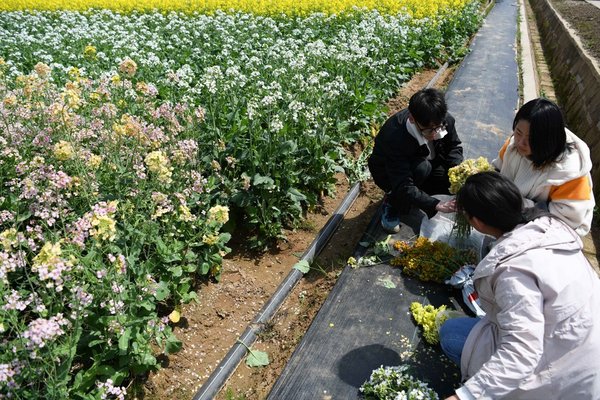Xi Story: China's Youth Stand at Forefront of Innovation
 |
| Students of Anhui Agricultural University collect cole samplings at an agricultural experimental base in Hefei, east China's Anhui Province, March 26, 2023. [Xinhua/Zhang Duan] |
BEIJING, June 29 (Xinhua) — At 6 a.m., Wang Wenxin, a graduate student of the "science and technology backyards" program at the China Agricultural University, is already busy with seed selection, fertilizing and data monitoring in the field of a village in suburban Beijing.
Over the past one year and more, Wang and her schoolmates have helped Fangezhuang Village in Pinggu District develop a smart farm covering 150 mu (10 hectares).
In early May, Wang and her schoolmates received a reply letter from President Xi Jinping. In the letter, Xi encouraged them to make greater contributions to rural revitalization.
Xi, also general secretary of the Communist Party of China Central Committee and chairman of the Central Military Commission, said he was gratified to know that the students went deep into the fields and villages to get to know about people's wellbeing and gain knowledge through serving rural revitalization.
Xi has on many occasions encouraged the country's youth to shine in innovation and creation. He said innovation is the soul driving a nation's progress and an inexhaustible source of a country's prosperity.
"Young people are the most dynamic and most creative group of our society, and should stand in the forefront of innovation and creation," said Xi.
On Monday, while meeting with the leading members of the newly-elected Central Committee of the Communist Youth League of China (CYLC), Xi stressed that the CYLC should mobilize youths to dedicate themselves to Chinese modernization and strive to become pioneers and a fresh driving force in sectors such as sci-tech innovation, rural revitalization, green development, and social services.
According to a report released in June 2022, China's scientific and technological talent have become younger in average age compared with a decade ago, with about three quarters of them aged 39 and below by the end of 2019.
Wang Weijun, 28, is one of the youngest members working at the Institute of Plasma Physics under the Chinese Academy of Sciences (ASIPP) in Hefei, east China's Anhui Province. It is home to the experimental advanced superconducting tokamak (EAST), or the Chinese "artificial sun."
Among the nearly 700 scientists and researchers working at the ASIPP, about 200 are aged around 30.
In April, EAST achieved a steady-state high confinement plasma operation for 403 seconds, a key step toward the development of a fusion reactor.
"We hope the first light powered by fusion energy can appear in China. That's the dream of all staff at the institute," Wang Weijun said.
(Source: Xinhua)
Please understand that womenofchina.cn,a non-profit, information-communication website, cannot reach every writer before using articles and images. For copyright issues, please contact us by emailing: website@womenofchina.cn. The articles published and opinions expressed on this website represent the opinions of writers and are not necessarily shared by womenofchina.cn.








.jpg)

 WeChat
WeChat Weibo
Weibo 京公网安备 11010102004314号
京公网安备 11010102004314号